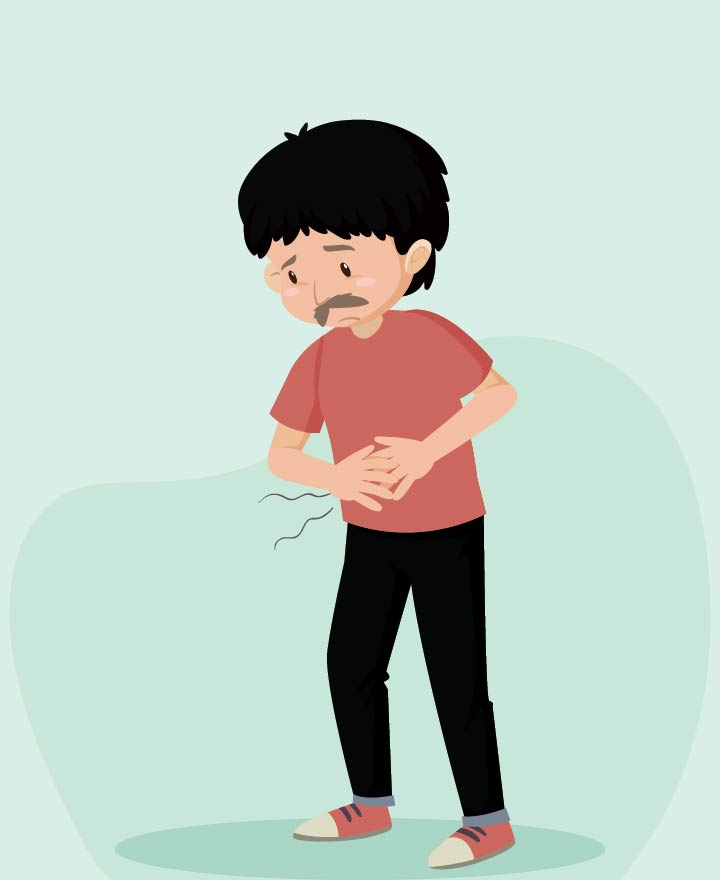

Understanding Abdominal Pain: Appendicitis vs Gas Pain
Appendicitis is inflammation of the appendix, found in the lower right abdomen, and can cause severe pain besides nausea, vomiting, and fever. On the other hand, gas pain results from trapped intestinal gas, making the patient suffer bouts of moderate to intense pain. Knowing the differences between appendicitis and gas pain will help differentiate the two medical conditions and help avoid further complications. Read on to know more.
What is Appendicitis?
Appendicitis is inflammation of the appendix, a small finger-like pouch in the lower right abdomen. The appendix doesn’t do anything noticeably important in the digestive system, but it can get inflamed and infected when stool, foreign objects, or swollen lymphoid tissue block it. This results in excruciating pain, often accompanied by other symptoms, such as nausea, low-grade fever, diarrhoea or constipation, and low appetite. Visiting a doctor pre-emptively can go a long way in avoiding severe complications, such as a ruptured appendix and peritonitis.
What is Gas Pain?
Gas pain is a more common issue related to the digestive system, where gas from the digestion of certain foods, like legumes, can get trapped in the intestines. Swallowing air while eating or drinking water, consuming certain foods (like beans or cruciferous veggies), or an imbalance of gut bacteria are the main reasons behind gas production. Gas pain makes life uncomfortable but is usually harmless and goes away independently or with home remedies. When experiencing gas pain for over a few hours, visit a doctor as soon as possible to rule out other severe underlying causes, including obstipation (severe or complete constipation) and reduced colon motility.
Appendicitis vs Gas Pain: Key Differences
Nature of Pain:
Appendicitis pain usually increases in intensity and becomes constant, while gas pain is often intermittent and can be relieved by passing gas or having a bowel movement.
Associated Symptoms:
Appendicitis can cause fever, nausea, and vomiting, which are less common with gas pain.
Key differences between appendix and gas pain are pain location, severity, and accompanying symptoms. Gas pain often resolves on its own. In contrast, early medical attention is crucial for appendicitis.
• Location of Pain:
Appendicitis pain follows a pattern. The pain originates near the belly button and then moves to the lower right abdomen. Gas pain, on the other hand, is unpredictable. It can start anywhere in the abdominal area and feels like bloating or pressure.
• Severity and Progression:
Appendicitis pain worsens over time and goes from a dull ache to a sharp, constant pain. Gas pain is mild to moderate, comes and goes in waves, and gives you temporary relief.
• Associated Symptoms:
Individuals suffering from appendicitis may experience symptoms like nausea, vomiting, loss of appetite, diarrhoea or constipation, fever below 100.4℉, and chills. A person suffering from gas pain rarely has any associated symptoms.
• Treatment Options:
Gas pain usually subsides on its own. Appendicitis doesn't provide easy relief, and the pain may worsen with movement or coughing. Doctors may recommend antibiotics and even surgery, depending on the stage of appendicitis and the severity of the symptoms.
How to Prevent?
When it comes to appendicitis vs. gas, you cannot prevent the appendicitis, whereas you can follow certain measures to avoid the gas.
Here are some things you can do to prevent gas pain:
· Eat your meals patiently.
· Always chew your foods properly before swallowing.
· Avoid carbonated or aerated beverages and foods that trigger gastritis.
· Indulge in regular physical exercises to enable gas movement throughout your digestive system, thereby reducing the pain due to gastritis.
Conclusion
If you have abdominal pain, especially if it’s severe, worsening, and comes with other symptoms like nausea or fever, visit the doctor immediately to confirm whether it’s appendicitis or gas pain. Early diagnosis and treatment of appendicitis or any abdominal pain are key to preventing complications. When in doubt, always err on the side of caution and consult a doctor. They conduct physical examinations, imaging tests, and blood tests to ascertain the exact cause of abdominal pain and recommend further courses of action.
One of the important components of our overall wellness is also being financially secured. Healthcare emergencies can happen any time, but a good health insurance policy can protect you from such uncertain situations. To know more about Wellness and other health related tips, visit the wellness corner.
Source: medicalnewstoday.com, healthline.com, verywellhealth.com, nhs.uk, mayoclinic.org
Disclaimer: This blog provides general information and discussions about health and related subjects. The information and other content provided in this blog, website or in any linked materials are not intended and should not be considered, or used as a substitute for, medical advice, diagnosis or treatment. Kindly contact your Doctor before starting a new medicine or health regime.
Related Articles
Appendicitis - Symptoms, Causes, and Treatment
Upset Stomach- Causes, Symptoms & Home Remedies
Common Digestive Disorders- Symptoms and Causes
Yoga for Indigestion- Top Poses to Improve Digestion ...
Food allergy vs. food intolerance - What's the difference
Published on July 12, 2024
Last updated on February 28, 2025














 Health Insurance
Health Insurance  Travel Insurance
Travel Insurance  Car Insurance
Car Insurance  Cyber Insurance
Cyber Insurance  Critical Illness Insurance
Critical Illness Insurance
 Pet Insurance
Pet Insurance
 Bike/Two Wheeler Insurance
Bike/Two Wheeler Insurance  Home Insurance
Home Insurance  Third Party Vehicle Ins.
Third Party Vehicle Ins.  Tractor Insurance
Tractor Insurance  Goods Carrying Vehicle Ins.
Goods Carrying Vehicle Ins.  Passenger Carrying Vehicle Ins.
Passenger Carrying Vehicle Ins.  Compulsory Personal Accident Insurance
Compulsory Personal Accident Insurance  Travel Insurance
Travel Insurance  Rural
Rural